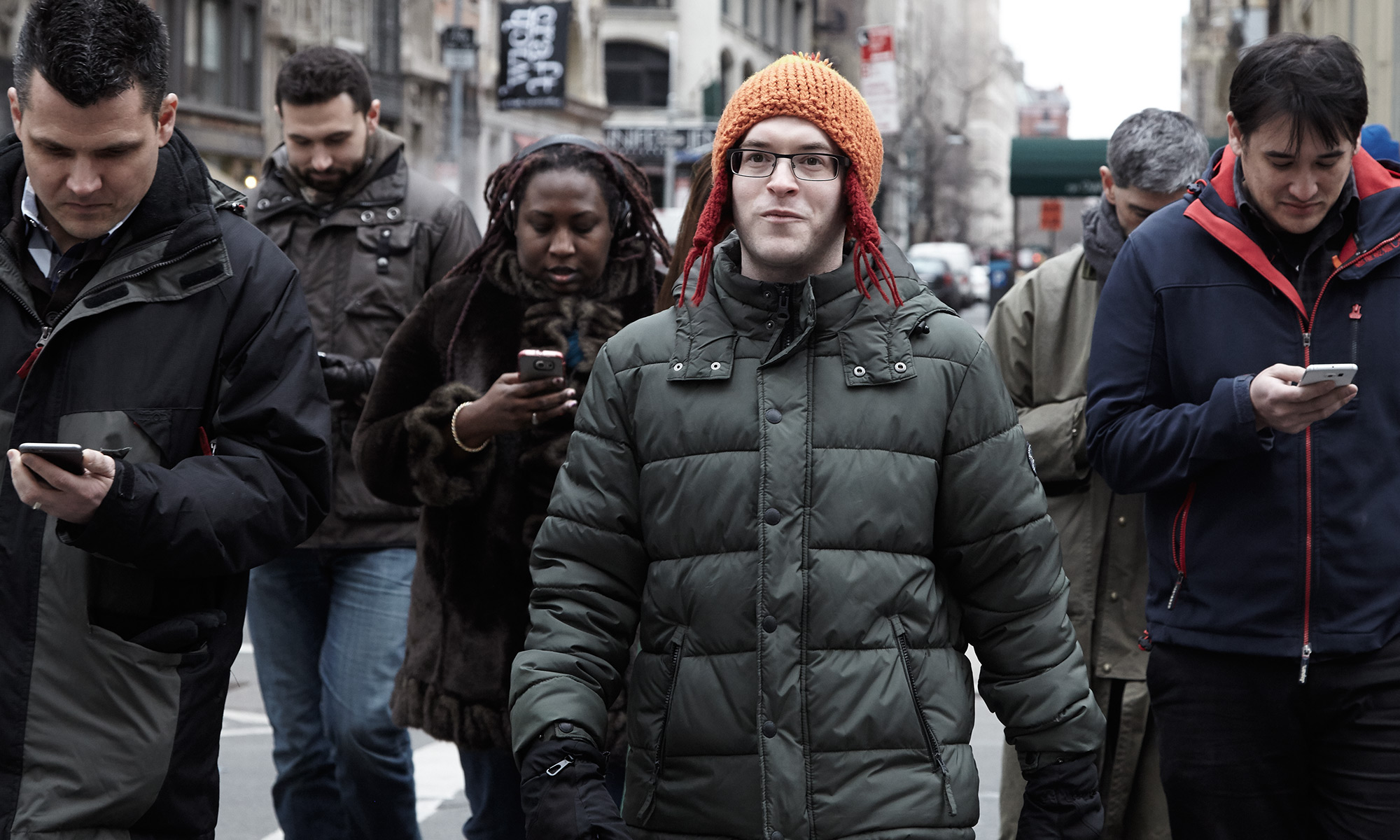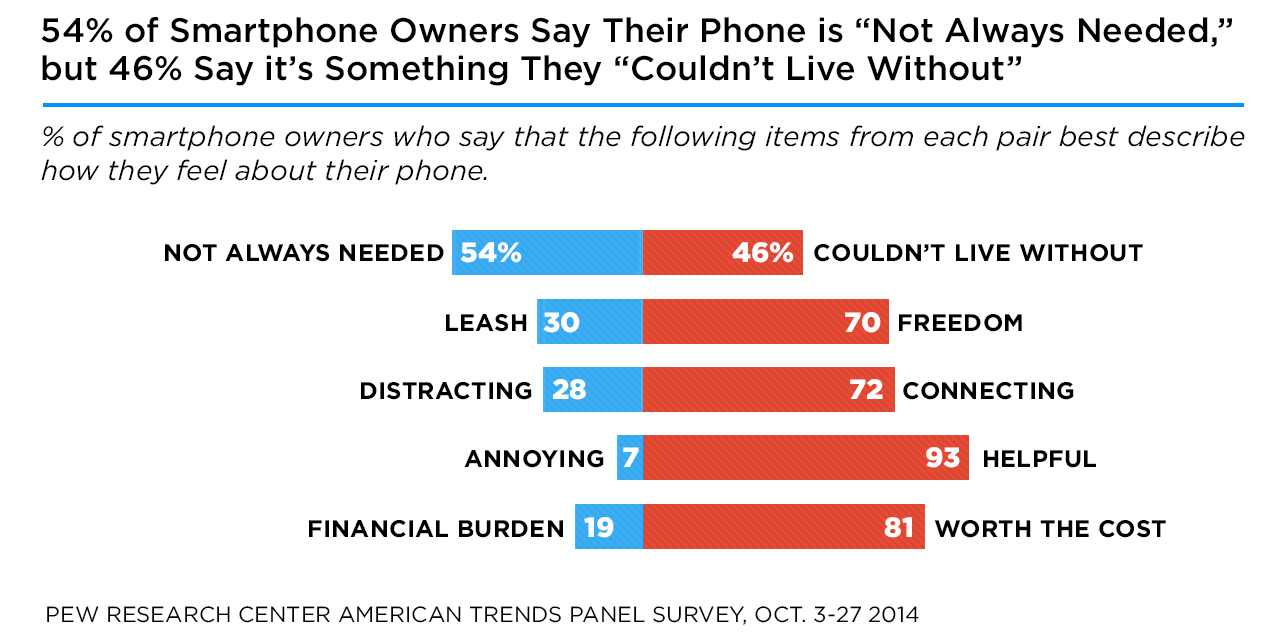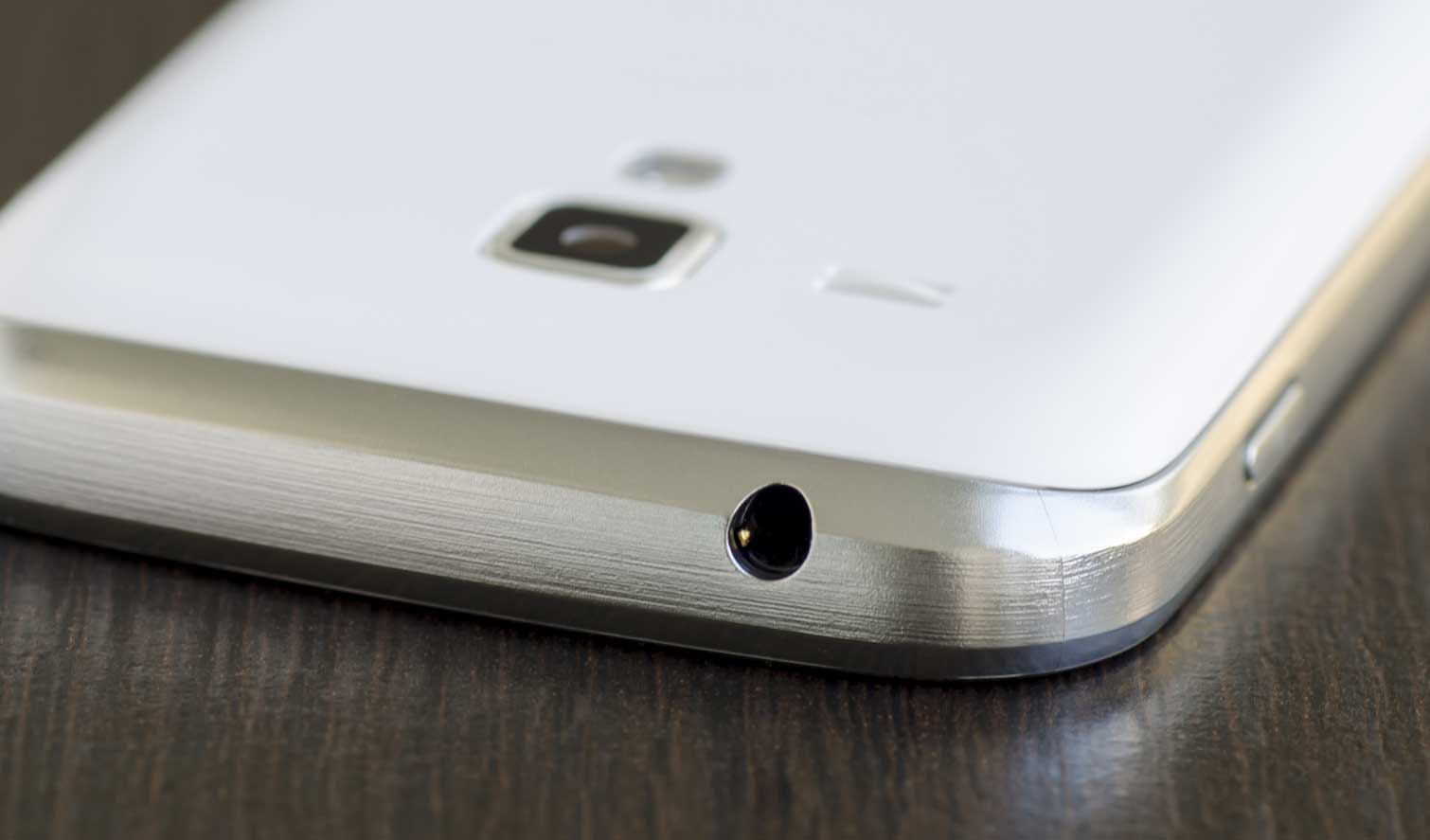What I Learned By Giving Up My Phone
It's hard to imagine living without a smartphone, but one of our writers did. Here's what he learned from going phone-free for two weeks.
As I stepped outside and felt the cold sting of a New York winter on my cheeks, I smiled. I was finally free.
A minute earlier, I had dropped my smartphone, packed in a cardboard box with padded envelopes, on the counter of a FedEx store. I wouldn't have to see the blasted contraption for another two weeks. At that moment, it was hard to remember another time when I'd felt so at peace with the world around me.

The truth of the matter is, even though I'm part of the age demographic that's supposed to love smartphones, I can't stand them. I have a smartphone — in my line of work, it's impossible not to — and I use that phone for both work and pleasure. But I have serious concerns about the impact of smartphones on our work time, leisure time and overall work-life balance.
"When personal life begins to impede on work life, not only will employees become less productive, [but] there is higher work stress and anxiety," said Kelly Allder, a vice president at Ceridian, which deals with the tech side of human resources. "With a smartphone in their hand, employees feel the need to be 'plugged in' and always on the job, even when they are in the comfort of their own home, taking a toll on their personal life."
Human beings lived without cellphones for hundreds of thousands of years. What harm could two weeks do?
Smartphones excel at helping you stay in touch with co-workers outside the office. But I'm not a doctor or a firefighter; being immediately accessible at home won't do my personal life any favors. I love zipping through Facebook and Twitter as much as the next young dude, but I shudder to consider how many hours I've sacrificed to aimless scrolling. I could have spent that time playing video games, watching TV or reading, and it still would have been more meaningful than re-reading old tweets and status updates.
So, when a Verizon representative informed me last month that my red Moto X with "Don't Panic" inscribed on the back had a busted charging port, I didn't sweat the repair time too much. After all, it was still under warranty. Human beings lived without cellphones for hundreds of thousands of years. What harm could two weeks do?
The Challenge
First and foremost, I don't want to imply that every single person could (or should) go without a phone. Some jobs really do require people to be on call 24/7, and some people live in situations where emergencies could crop up at any time. However, I'm a young, healthy guy with an office job, a predictable routine and — this turned out to be incredibly important — a Google Nexus 10 tablet. I wanted to know if my smartphone was really as vital as I'd come to believe, or if I'd been using it as a crutch for no real reason.
Get instant access to breaking news, the hottest reviews, great deals and helpful tips.

(An astute reader may observe that going without a smartphone while keeping a tablet is not much of a challenge at all. Indeed, as long as you're at a Wi-Fi hotspot, it's not. However, a Nexus 10 is a Wi-Fi-only device with a 10-inch screen. It's not easy to carry it without a backpack, and it's not connected to the Internet constantly. When you're out and about, a large Wi-Fi tablet is only marginally more useful than a laptop. It can keep you entertained, but it can't help you look things up instantaneously or communicate with anyone instantly.)
Think about what a smartphone does: It's a combination of a radio telephone and a computer. These things are handy to have in our pockets, but are they things we really need?
I grew up during the '90s, when cellphones were big, blocky bricks that your parents had (some of the time), but they were used only in emergencies. There was no direct equivalent to texting for people who didn't have cellphones, but we had landlines for phone calls, Game Boys for handheld gaming and books for, well, reading. We couldn't talk to anyone not right next to us while on the go, but otherwise, there was no reason for us to be out of touch with our friends and family, or bored on the train.
MORE: Best Tablet - Top Tablets on the Market
While my generation should know better than to be wholly dependent on smartphones for communication and entertainment, we are hardly alone. "Age doesn't necessarily factor in," Allder said. "There are Generation Y users that might get up to speed with the latest apps faster, but Gen X or baby boomers also use smartphones as a necessity."
Trials and Tribulations
On my first day without a phone, I arrived at my subway stop and nearly panicked when I reached into my empty pocket before remembering that I had deliberately left my phone behind. I felt much calmer, but also pretty bored. I'd become so used to scrolling through social media before my train arrived that I felt a little lost without it.
However, it didn't take me long to realize that I had better things to do than stare at the station wall for the next 5 minutes. Reading on the subway is my favorite way to pass the commute, and I found that by whipping out a Nook Simple Touch e-reader as soon as I started waiting, I could read an additional five to 10 pages per day.
I realized, too, that I didn't need a phone for almost anything I liked to do during my commute. Thanks to my tablet, I could watch videos, listen to music and play games, provided that I was willing to preload them when I had Wi-Fi. This required a little forethought on my part, but was no worse than packing a Game Boy Color or an Asimov paperback in my middle-school days.
There's a certain charm to being alone with your thoughts, but I can't say I had any interesting epiphanies while standing around with my thumbs in my pockets.
Once I got to work, I missed my smartphone even less. I told people who usually texted me to grab me on Facebook Messenger or Gchat instead. To my knowledge, I didn't miss any important messages from anyone. I was still able to set up plans with my friends and family in real time, although if anything changed after I left the office, I realized I'd be out of luck.
Still, I don't want to give the impression that any of these devices were perfect stand-ins for my smartphone. A Nook and a Nexus 10 are both relatively large, bulky devices that don't fit easily into a pocket, if they even fit at all. Digging through my bag for a tablet whenever I wanted to pass the time proved to be a bit of a chore.
When I didn't have my backpack — standing in line at a pizzeria, or waiting for my family at a restaurant — I didn't have much of a choice except to stare at the wall for a while. There's a certain charm to being alone with your thoughts, but I can't say I had any interesting epiphanies while standing around with my thumbs in my pockets.
What's more, online chat can't directly replace texting. For one thing, unless you're willing to keep Facebook or Gmail open on a tab all day — and I am not, as both cut into productivity too much — you're not always accessible. If someone needs your attention, they're going to either have to wait for a few hours or call your office phone (which isn't always ideal for personal calls).
Speaking of phone calls, they wound up being something of a problem. Texting may be the norm these days, but when you need to exchange lots of information in an open-ended fashion, typing still can't hold a candle to a quick conversation.
If I wanted to talk to someone on the phone, I had to either call them from my office number or arrange to be on Skype after office hours. Neither solution was nearly as elegant as simply walking outside the office with my mobile phone and having a private conversation.
MORE: How to Make Skype Calls Using an Android Smartphone
Finally — and perhaps most importantly — life without a cellphone or landline means that you have no way to communicate immediately during an emergency situation. For me, this would probably not be a big deal. I live and work in a big city, and I have a roommate at home. If something catastrophic happened, someone almost always would be in reach to help me. A person who lives alone, or in a rural area, without a landline doesn't have that luxury.
The Unexpected Virtue of Silence
By the end of my first week without a phone, I found that I didn't miss the device at all. Reading over short stretches added up, and I finished both “The Dead Zone” by Stephen King and “The Parable of the Sower” by Octavia Butler during my phoneless fortnight. Both titles were infinitely more rewarding than awaiting notifications from a Facebook flame war sparked by an ill-conceived political post.

Not having to deal with constant texts from friends and family also proved to be a boon, both at work and at home. Sure, people could still reach me quickly enough via email or chat programs, but people seem more hesitant to do this. Somehow, we've internalized the idea that texting is a never-ending friendly chat — fun and informative, but also sometimes talking just for the sake of talking.
As Allder pointed out to me, "Providing unnecessary details and too much information wastes people's time and adds to overload," and constant smartphone access puts this temptation front and center.
Reading books felt infinitely more rewarding than awaiting notifications from a Facebook flame war sparked by an ill-conceived political post.
Other forms of online communication, such as emails, tend to be more purpose-directed. As a result, the messages that did make their way to me seemed more vital and to-the-point. "Good communicators have a number of things in common," Allder said, regardless of the medium used. "They are clear, concise, correct, complete and courteous.”
And that became a recurring theme of my phone-free existence: I found I got a lot more out of the Internet when I knew I would have connectivity only in short bursts. Just as eating a favorite food every day will ruin its flavor, constant Internet access had removed a lot of the fun and wonder of being connected. Believe me, when you may only have a minute of Wi-Fi before your subway pulls out of the station, you learn to be mighty efficient online.
Wireless Life Lessons
By the end of two weeks, I had fully adjusted to life without a phone — which made it the perfect time, I suppose, for a FedEx box containing my repaired handset to show up on my doorstep. Tweaking my settings to just the way I liked them took a few hours, and after that, I was almost disappointed to discover how quickly life went back to business as usual.
I spent my next subway ride glued to my tiny screen, letting my copy of "Paddle Your Own Canoe" by Nick Offerman fall to the wayside. There were so many texts to read, and so many tweets that warranted replies, it seemed hard to believe that I could have put it all aside without the world ending.

And yet, the world didn't end, by most accounts. During those two phoneless weeks, I had accomplished everything I needed to get done at work. I spent time with my family and friends. I had instantaneous digital conversations, both long and short, as well as written and voiced. When I sat back and really thought about it, the only times I was inaccessible were when I was traveling between Wi-Fi-enabled spots. Maybe we should make ourselves a little more inaccessible now and then.
Our time is not only valuable, but irreplaceable. We should take care, lest we feel as though we owe it to everyone, of every hour of every day. We spend an awful lot of time and money to be connected at all times, but we probably don't need to be. And, at least in my case, I benefited from not being connected constantly, gaining peace of mind and accomplishing many tasks.
I learned that I could probably ditch my 4G data connection and turn out just fine, save for when I cover trade shows, as a constant connection to the workplace is actually necessary then. I also learned that, while I like having a smartphone, and I do get some use out of it, it ultimately does just about as much harm as good. Communicating with people anywhere can be helpful and diverting, but constant Internet access lends itself very easily to wasting time and stressing yourself out.
MORE: How to Buy the Right Smartphone for Your Needs
I'm not demanding we go back to the "good old days" of the '90s, especially since my perception of that era is invariably tinged with childhood nostalgia. At the same time, we are not so far removed from a smartphone-less epoch where we still called friends and family, emailed from our offices and distracted ourselves on the subway.
"Cellphones, computers, portable music players and many other gadgets put technology at our fingertips 24/7," Allder observed. "Know that smartphones are a key tool in improving your work-life balance, not one meant to hinder your productivity. Know when to unplug and enjoy your personal time, but also when to focus on work tasks at hand."
If you're really using your smartphone to stay productive and entertained, more power to you. If not, it might be time to ask yourself why you have one.

Marshall Honorof was a senior editor for Tom's Guide, overseeing the site's coverage of gaming hardware and software. He comes from a science writing background, having studied paleomammalogy, biological anthropology, and the history of science and technology. After hours, you can find him practicing taekwondo or doing deep dives on classic sci-fi.
-
jignacio2204 Interesting experiment!! Our generation did grow up in that era where we went from wired to wireless. It would be even better if this experiment were done with some of the newer generations. I wonder what some of the differences would be?Reply -
LovelyLove Great experiment. It would have been even more interesting if you did not allow yourself to use any other convenient portable wireless devices in addition to your smartphone, but still allowing yourself to use a computer (desktop or laptop) and landline phones. Ok, that would be torture but very interesting. :)Reply
